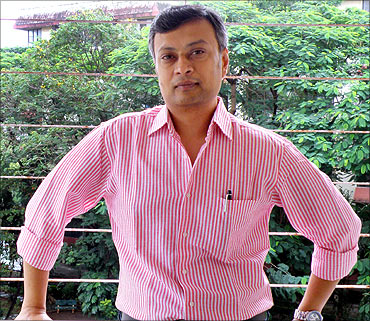
Started with a meagre personal savings of Rs 30,000 by Pankaj Acharya, the company has today grown into a full fledged advertising and marketing solutions company with revenues of over Rs 28 crore (Rs 280 million).
From a small 5-member team, Purple Focus is now an 80-member organisation serving clients like Bajaj, DLF, Eicher, Tata Indicom and Nokia, to name a few.
'Our business in life is not to get ahead of others, but to get ahead of ourselves -- to break our own records, to outstrip our yesterday by our today.' This has been Pankaj Acharya's guiding philosophy. He believes himself to be a born entrepreneur. The entrepreneurial streak was evident in him from his school days.
"As a school student during summers, a very close friend of mine and I would create handmade greeting cards and go door to door selling them. We would also carve knives and daggers out of wood and adorn them with various beads and wires to create showpieces and sell them," he says.
More than success what mattered to him was satisfaction in whatever he did. "The experience of creating something new from the scratch, nurturing it and seeing it bloom has been an exhilarating experience," Pankaj says.
Click NEXT to read how Pankaj Acharya quit a good job, pursued his interests to become a millionaire . . .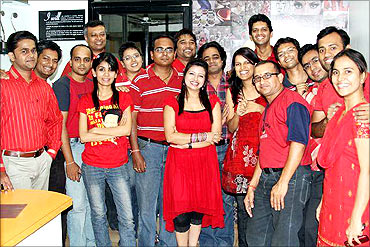
Even as a high school student in 1984, we started a sort of loyalty card (discount card) for our neighbourhood, where in people would pay a small fee to become a member and own this card, which would entitle them to discounts and freebies among the registered group of retailers. The registered retailers were guaranteed footfalls and hence they offered to honour the card and provide discounts.
During my engineering days at the hostel we replicated this business and it was a huge success. It was a logical idea and a win-win for all.
Then, during my MBA course, a couple of friends and I got together to organise a huge consumer trade fair at Indore, with almost 150 stalls. It was very successful and self satisfying venture at that time.
. . .
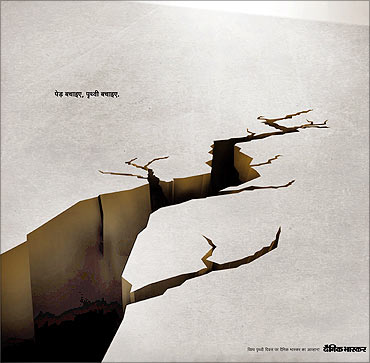
During my MBA course, I did my summer training at Lintas in 1994. I realised direct marketing as medium of future for communication. So I turned down a coveted offer from General Motors and joined Datamatics Direct to pursue my interests.
But I guess my DNA did not allow me to serve somebody hence I took up their concessionaire for Madhya Pradesh, came back to Indore to start my own. This is how Focus Integrated Marketing Services (Now Purple Focus) was born.
For almost a year, the focus was purely on direct marketing as the industry as a whole was in a very nascent stage and there was a huge void for a good advertising agency. But we had the core skill sets required so it was a natural progression to get into advertising. Bridgestone was our first major client.
. . .

Those were troubled times when the industry was facing a recession. For us, it was a boon as we had nothing to lose. We gave it our best shot and our hunger, small agency nimbleness and cost efficiencies helped in acquiring a grip.
What kind of constraints did you face initially? How did you overcome the difficulties?
I am a very optimistic person. So even in troubled times, I saw a world of possibilities. As advertising business had not caught up, we ventured into direct mailing working on novel concepts like share mail, wherein 4-5 brands who target same/similar audience share the expense and would go in a single envelope.
We ventured into events, conducted consumer fairs, which helped boost trade and commerce. We started a kids club with more than 5,000 members, which was then later sold off to a major newspaper. All this took place at Indore.. . .

Well, finances were a problem. This venture was purely funded with my personal savings of Rs 30,000 earned during my initial venture as MBA student.
I did not take a single penny from anybody, not even my family. I had a few LIC policies, which helped me get a small term loan from the bank. A friend allowed me to use his office space on a relaxed rent payment schedule.
. . .
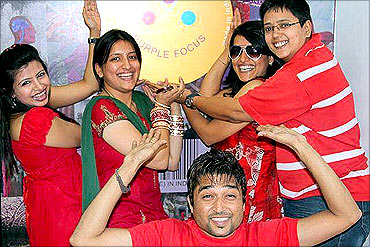
They were very supportive, though at times they felt I should not have turned down the campus job offer from General Motors.
My wife was supportive, too. I got married at the time I started this company and my late grandfather, truly believed in me and my dreams, always had very high expectations from me and encouraged me a lot.
How difficult was it to hire people? You have hired people from a varied background, how does it help?
Hiring has never been difficult. I firmly believe that if there is like mindedness and a mutual respect for each other as individuals, I think working towards common goal is never difficult. Skills can be taught, but attitude has to be assessed to see if it matches or not.
As advertising and communication is more about influencing minds and hearts of people, a varied background helps. It helps avoid 'templatizing' the whole process of creating communication and retains the freshness.
. . .
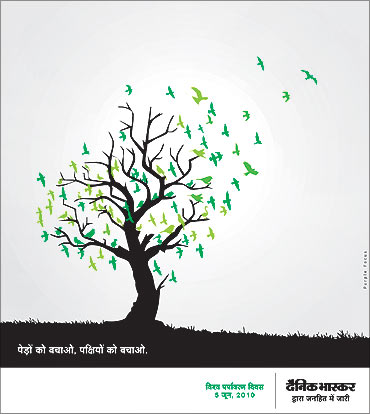
Well, in these 15 years, I have understood the involvement of marketing professionals while developing a campaign actually makes them extremely myopic.
The audience out there is flipping through magazine, driving the car and listening to radio or is watching television for entertainment. His state of mind and the way he is going to decode the message is uninvolved.
So rather than a 'think' level, a 'feel' level filter should be applied. If it feels right, it is what common sense is all about right? The entire approach is people centric rather than business centric.
. . .
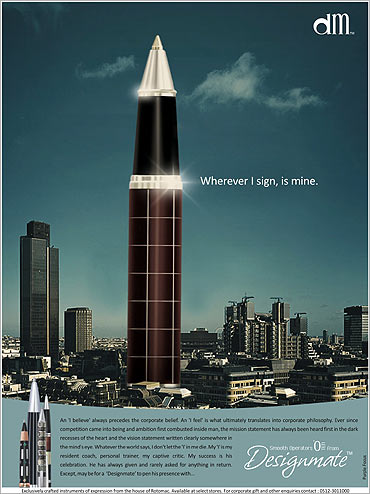
A killer campaign is one which somewhere influences your heart or mind. The basic principle of psychology of cognitive dissonance theory is at work everywhere.
The likeability of campaign is going to drive the change in attitude towards the brand. That's how great campaigns have done in the past. And it will continue to do in future.
What is the process that goes beyond building an advertising campaign? What do you focus on?
We focus on happiness for all the stakeholders -- the client, the team, the audience, the consumer, every stakeholder. It's not only about great outcome but also as much about the process.
. . .
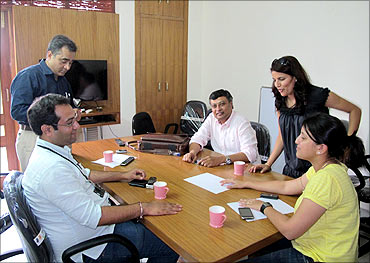
The overall business has grown over the years; the number of clients have grown for all of the 3 ventures. All the 3 ventures are profitable.
How do you sum up your experience as an entrepreneur? How do you compare it to a regular job?
It has been a self-satisfying exercise. I believe in competing with myself. I do not need to prove myself to anybody but to myself. I believe in setting my own goals, achieving them and setting new ones again. That makes everyday a worthwhile experience.
. . .
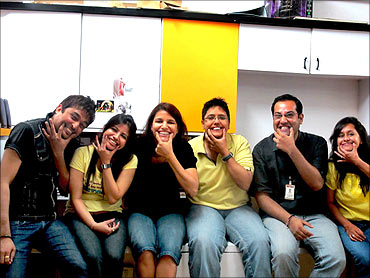
Indians by nature are very resourceful and entrepreneurial. Research has proven a country's economic drivers are its small and medium industries.
There will be many more entrepreneurs in India in future. It is already happening. Today IIM & IIT graduates no longer dream of joining the MNC brigade, there are many who want to realise their entrepreneurial dreams.
What are the most important things that entrepreneurs must have to succeed?
The most important thing is to have a dream. It all begins with dreams. Hunger, passion and a will to realise that dream.
. . .
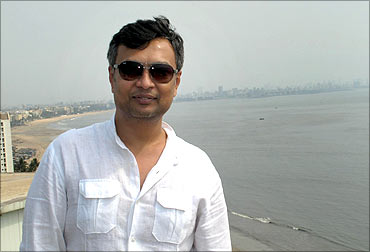
I am impressed by what Sir Martin Sorell has done, building a global advertising and communication empire - single-handedly.
What are the reasons for your success?
The biggest reason for the success my companies have achieved is thanks to my team. I am what I am because of my team.
What are your future plans?
I have already rolled out one new company, to do content production business. Going forward, I have plans to launch a digital agency, a specialised research and consulting unit. I would also like to explore international emerging markets. The future looks bright.